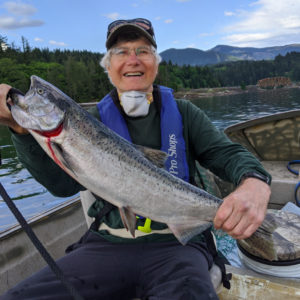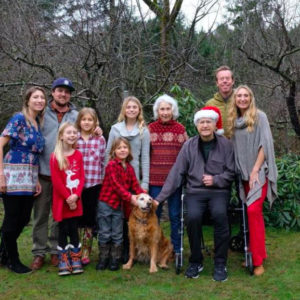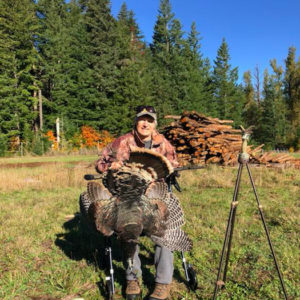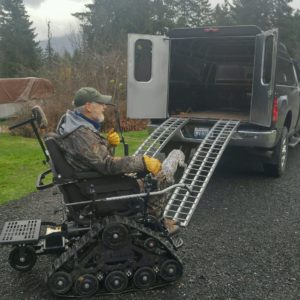What can you tell me about your brain injury?
February last year, I was diagnosed with Prostate Cancer, so my urologist and I decided that we’d do the surgery, and on May 21st I had my prostate out. By the end of June, I was feeling great. I was hiking again and cutting firewood, and I had three bird dogs I was training, and I was getting out with them.
But on Friday, July 5th, I’m sitting in the chair I’m in now, and I just started to take drink of hot coffee, and all the sudden my left arm and leg just started flopping up and down uncontrollably. Then all the sudden I couldn’t feel anything on my left side from my neck down, so I knew I had a stroke. I yelled for my wife who was sleeping right upstairs above me, and so she came down I said, hey, call 911 — I just had a stroke. I could still speak. The ambulance came and took me into Peace Health in Vancouver.
By July 25th I was able to sit up and get transferred to a wheelchair and get up with a cane with somebody on my left side assisting. And I could walk a bit, so I went over to the RIO and things were going pretty well. The problem was I had so much tone in my leg that it would stick right out straight, and I had a heck of time to relax it and bend. Around the same time, it was time to have my first PSA since my surgery, so I had the PSA and it came back and the doctor came in with it, and the doctor said, you’ve got Stage 4 prostate cancer.
I guess I should back up a little bit. In 2001, I was diagnosed with Chronic Lymphocytic Leukemia (CLL). So, I dealt with that, had been dealing with it, still dealing with it. But I’d been able to manage it. It’s a chronic disease. I didn’t have to retire or get out on disability. I was able to work my full career and I was in good shape.
How did you get through all of this?
I just said to myself one step in front of the other. I said if I get up in the morning and my feet are on the floor, I say, hey, I do feel pretty good. So, I’m going to make the best of it. I was doing in-home PT and OT until near the end of October and I was doing really well. I started to be able to move my toes, and I was walking around pretty well with a cane and doing my exercises. I’d listen to 70s or 80s rock, and so I’d get through my exercise and start dancing. My wife’s like — what are you doing? And I say get over here and let’s dance!
How has your life changed most dramatically since your stroke?
A year ago March, before I had the surgery, I was skiing with my grandkids down at Mount Bachelor. I’ve always done a lot of hunting and fishing and camping. I wasn’t one to sit around. Besides taking care of our ten acres, I was training dogs and doing things with my wife. And before I retired in 2009, I worked for the US Forest Service. I was a professional land surveyor for the Forest Service and had a 32 1/2-year career. I did a lot of traveling. I saw some really beautiful country, and it kept me in good shape. Dragging equipment up steep sides of mountains, and climbing over logs, and working in some pretty extreme weather at times. But I loved it.
Of course, now it’s a lot harder to do things, but I’m going to do them. Last fall a friend brought me out and I was able to harvest a fall turkey. The other thing I’ve been able to do is I’ve started to mow the lawn. It’s a powered mower, and the front wheels turn, so I’m able to hobble along behind it. I’m able do part of the lawn and I’m pretty tired. I usually take a break, or I don’t do it all in one day. I just figure I’m not going to get any better unless I get moving. And I’ve started reading again. When I started, I noticed that after I read two or three pages, I got tired and had to stop. Now I can read for an hour and I still don’t feel tired, so I am improving.
Just before they shut down PT and OT because of Covid, I was finally able to put my own socks on, and my brace, and my shoes, and tie them. So that was huge. I could get myself dressed, and that really took a lot of stress off my wife. She was having to do all that.
Any advice for people out there who aren’t as motivated as you?
I would say, look, I’ve dealt with this. This happened. Whether it should have or not is out of my control right now and I’m just going to make the best of it. I can sit and just feel sorry for myself or make the most of my life that I have left. That’s what I am and plan on doing.
And I think it’s really important for people that have just been diagnosed to be able to talk to another person that has the same diagnosis, so they know then that they are not alone, and that you can live going forward. I’ve really enjoyed being on the BIC zoom meetings. It helps to talk to other people and see what they’re dealing with, and how long they’ve had to deal with it. I’m just a year out July 5th so I’m encouraged by the amount I’ve improved since then.
Sometimes I get a little bit down, and I have to stop and go, Ok, where were you on July 6th of last year? And they had to help me roll over in the bed. I was just flopping around like a beached whale. Things are just slowly getting better and I just keep working on it. The other thing I’ve done is I’m seeing an acupuncturist.
Is there anything else you’d like to share?
I think that what helped me — I had already decided I was going to enjoy life — but I think the CLL helped train me for these other two episodes that I dealt with. Prostate cancer and the stroke. When I was first diagnosed with the CLL it was a surprise. I was only 47 years old, and my wife and I had only been married for about three years. And they told me the average life expectancy for CLL is around seven years. So, I think I moped around for about three or four days, and then one morning I was out walking our dogs and I looked around and I said, you know, I feel pretty damn good. Stop moping around and get on with living! None of us are going to get out of this alive. My grandfather used to tell me that if you live long enough breathing’s going to kill you. So that’s been my policy. And the other thing I kid with all my doctors — I say
well I’m like my blood type. They say what do you mean? And I say it’s B-positive.
Is there anything you think would be beneficial for friends and family of people who have had brain injuries or cancer to know?
That their loved one that has the brain injury is the same individual. They just can’t do what they used to do, because the brain isn’t allowing them to. And they need just as much love and caring as they did before.





